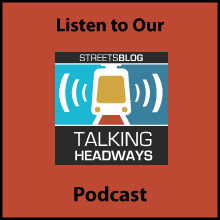(Unedited) Podcast Transcript 463: Congressman Earl Blumenauer
December 20, 2023
This week we’re joined once again by Congressman Earl Blumenauer of Oregon’s 3rd District. We chat about connections between health care, food and transportation, progress on the Inflation Reduction Act and IIJA infrastructure bills, and future directions for transportation funding.
Listen to this episode at Streetsblog USA or in the hosting archive.
Below is a full AI generated unedited transcript:
Jeff Wood (2m 57s):
Congressman, Earl Blumenauer, welcome back to the Talking Headways podcast.
Congressman Blumenauer (3m 23s):
Happy to be here.
Jeff Wood (3m 24s):
Well thanks for coming back. Sorry we missed each other at Mpact, but what did you think of the conference?
Congressman Blumenauer (3m 28s):
I thought it’s kind of exciting. Have about a thousand people who care about things that we care about, trying to make families safer, healthier, and economically secure. Dealing with thoughtful investments in infrastructure and how we put those pieces together and having them talk the language and get excited. I, I thought it was great.
Jeff Wood (3m 49s):
That’s awesome. Well, this is our third discussion actually, and third discussion around the Mpact timeline. And I’m looking forward to many more discussions about these topics we both deeply care about. And you recently announced that you weren’t running for a 15th term, but will stay focused on local issues in Portland, but lots of other outlets have discussed that topic. So I wanna actually ask you, is there a topic that you haven’t discussed that you wish you were able to talk more about?
Congressman Blumenauer (4m 13s):
Well, Jeff, my, my interest is I, I wanna continue working on the things I’ve been working on. A lot of it centers around livable communities and having the government be a better partner. But it isn’t just in terms of land use and transportation issues of housing, of parking management, which I think ties to housing and air quality. Our food and agriculture policies. I mean, we need to stop subsidizing a diet that makes Americans sick. I mean, these are examples of things that are within our capacity. And I think if I were able to not be in Congress doing Congress things, political stuff and interminable meetings and politics and instead be able to just work on issues with people and governments and companies, I think it would be more rewarding.
Jeff Wood (5m 11s):
Is there something that a local farm Bill would look like? We’ve talked about this the last two times we’ve chatted and I really enjoyed those conversations, but I’m wondering what something outside of Congress would look like from a farm and city perspective.
Congressman Blumenauer (5m 22s):
Well, we need to make sure that each community has a set of policies in place that speaks to local food production and nutrition. We’re involved in an experiment in Oregon. We got a waiver from the federal government for the Medicaid program, which will allow us to use Medicaid dollars to be able to deal with housing and nutrition. These are things that people don’t typically associate with Medicaid, which is more, you know, traditional medicine. But what we’re finding is that when people have the opportunity to have a a healthy diet, fresh foods, and this is a little more expensive than what consumers are used to paying for, but it ends up being cost effective.
Congressman Blumenauer (6m 17s):
So having a healthcare provider, or in this case Medicaid pay for that healthy food ends up giving better health to the individuals and saving the federal government money. Likewise, housing has a profound effect on the community, on air quality, on environment, how we relate to one another. And of course the homeless crisis relates directly to unaffordable housing. And if we’re able to use Medicaid dollars to not just subsidize healthy food but a healthy living environment, it’s a win-win.
Jeff Wood (6m 57s):
Yeah, and I know California was looking for a waiver as well on the housing discussion because of the same types of issues. And it’s interesting to think about how that housing connection goes with health because ultimately there’s a lot of folks who are put into, you know, hospital beds for a long period of time and each of those hospital beds are so expensive, but paying $2,003,000 a month for rent for six months or so to get them back on their feet is actually much cheaper than those hospital beds maybe for even a week.
Congressman Blumenauer (7m 24s):
Bingo. You are absolutely right. And we’ve had some pretty good research that talks about what happens after we’ve taken somebody and stabilized their health. Maybe they are, people who have been suffering from being homeless are addicted, we’re able to stabilize the condition, but if they are discharged into the community without stable housing, they will end up being back in the same situation and costing more money as you point out than if we just taken care of them in the first place.
Jeff Wood (8m 2s):
I’m about to put solar on my roof and get a heat pump and replace my gas furnace I have here in San Francisco. And we can do that in part because of the Inflation Reduction Act. Yeah, and your work on that and I appreciate that. I’m wondering if you could dig into the process of that bill and, and how important that will be for our climate goals going forward.
Congressman Blumenauer (8m 19s):
Well, this is the most comprehensive, impactful piece of climate legislation we’ve ever had anywhere in the world. Some of these we’ve been working on for years back to the Obama administration in terms of some of the incentives, for example, for clean energy. This I think is going to be pathbreaking. It ties the pieces together and in the past we’ve fought on a incremental basis. you know, we fought to extend a tax benefit for solar or wind for a year or, or maybe two. This is a 10 year window.
Congressman Blumenauer (9m 1s):
So people like You can afford to take the long view and be able to make investments that may not make sense if it were just for a year or two. But if you’re talking about five or 10 years, it absolutely pays off. I’m very excited about having these pieces together. I, I like the fact that we extended it to apply to nonprofit organizations, sort of the direct pay for the subsidy. It’s much more efficient, but it enables a broader range of services to a wider a range of providers. These are items that I think are going to be very profound in terms of the longer term investment that we need to make in our community, whether it’s heat pumps or storage, making transition to electrification of transportation and not just electric cars and buses.
Congressman Blumenauer (10m 2s):
I mean the opportunity here for the batteries for electric street cars and buses to be part of a storage program so that we are able to store that energy up when it’s cheaper and then use it when it is more cost effective, I think is is profound. Having the storage capacity of electrification of our transportation system.
Jeff Wood (10m 29s):
I was talking to folks at Impact about that, specifically thinking about how they’re going to be collective with the trash trucks and the, and the buses and thinking about how they can electrify their fleets as a whole and how, you know, the Inflation Reduction Act might help with that. I’m wondering, can you talk a little bit more about direct pay? ’cause I think that’s a really important point, especially as more cities and you know, nonprofits and other folks try to kind of collectivize the electrification process for buildings, for houses, all those things. I think that there’s a really important point to be made about that direct pay issue.
Congressman Blumenauer (10m 60s):
I’m glad you raised it. This is something we fought to put in the program and the Obama administration, but it was temporary in nature and the direct pay provided the opportunity to give the subsidy directly to the recipient rather than having to launder it through a, a tax credit for somebody who had a tax livability. A lot of that benefit was shared with tobacco companies and banks, people who showed a profit by being able to pay directly the subsidy to the beneficiary, it’s more efficient and we’re not limiting the people who can take advantage of it.
Congressman Blumenauer (11m 42s):
I think this is profound. It’s something I was excited 10 years ago for us to be able to get on the table, but this is now a permanent feature of the tax code.
Jeff Wood (11m 53s):
We’re also tiers removed from the IIJA. How is that bill aging and, and are there any lessons we can take away from the last two years or so?
Congressman Blumenauer (12m 1s):
I think it’s aged well. I mean, we’re putting the money out there in areas that we’re sorely in need programs for transit for the opportunities that we’re looking at for Amtrak biggest investment in passenger Rail in American history. These are items that help jumpstart programs that really need to come to scale. And this is something that is really encouraging in terms of the volume of money that’s involved and the range of projects we can have. It’s also what we’re doing with broadband, which is an important part of the infrastructure these days for education, for healthcare.
Congressman Blumenauer (12m 46s):
I mean, during the pandemic, if we didn’t have telehealth, given the challenges of providing services, the workforce problems, telehealth was a, a lifesaver. It really helped in terms of providing education when services were disrupted due to the pandemic. But having that broadband made it much more effective. We, we had stories of kids going to McDonald’s parking lots so that they could, you know, do their papers. This helps bring over $50 billion to upgrade the services of broadband, which again, is increasingly tied not just to the practice of medicine, but to transportation itself.
Congressman Blumenauer (13m 35s):
How dependent we are in terms of having opportunities for systems to work better. I just am excited about what’s in the pipeline, how people have embraced it. The Biden administration is committed to a low carbon equitable future and they’re doing it all across the country.
Jeff Wood (13m 55s):
Where are we at with e-bikes?
Congressman Blumenauer (13m 58s):
Well, I was optimistic that we may be able to get my e-bike legislation moving, but it looks as though that’s a long shot with the Republican Congress, which is increasingly dysfunctional. Think about that for a moment. They’re, they’re even less functional. The discussions this week about the odd way they’re trying to keep the government running and alienating everybody, I think ultimately we will be able to get a federal subsidy for e-bikes. It’s just so popular. People really love it. We’ve seen that in terms of how it’s been embraced with bike share, the e-bike component is wildly popular and the e-bike makes anybody into a bicycle commuter.
Congressman Blumenauer (14m 49s):
If we’re serious about meeting our climate goals, the more opportunities we have for e-bikes, the more successful we will be. And it’s not just the individual e-bike, the opportunities for cargo bikes, I see the cargo bike as the solution to some of the pollution, the congestion from, you know, FedEx and Amazon trucks. A cargo bike can just as easily deliver toothpaste and toilet paper. You don’t need something that large clogging city streets. It’s faster and it’s more efficient. And of course, as you and I know that’s how UPS started in the first place over a century ago in Seattle as a bicycle messenger service.
Congressman Blumenauer (15m 35s):
And cities are now looking at that and having an opportunity to coordinate package delivery out of a, you know, a single location which everybody could benefit from. It’s simple, it’s common sense, it provides efficiency for everybody and an electric cargo bike really makes it hum.
Jeff Wood (15m 54s):
I also wanted to get some of your thoughts on transportation funding sources. There’s a lot happening on this front, but the gas tax is still where it was in the early nineties. We’re seeing an uptick in electric vehicles, transit agencies that once were laed for relying on fares are now facing some really tough fiscal crises and circumstances. And then we’re seeing the street filled with different delivery vehicles, like you’re just talking about micro mobility, self-driving vehicle testing. It seems like we’re at a fork in the road and I’m, and I’m wondering what direction we’re actually gonna head on on funding.
Congressman Blumenauer (16m 21s):
Well, I have been the allied champion for road user charges. I for years assembled a big coalition from labor to the chamber. Truckers, bicyclists, environmentalists, local government. The largest collection of advocates for a controversial issue was the group that I put together for my gas tax increase. We had everybody on board except the people and my colleagues, but actually that’s not such a bad outcome. We’ve reached the point now with the electrification of the system that the gas tax is in a downward spiral.
Congressman Blumenauer (17m 5s):
As we have more and more electric vehicles, the gas tax is less and less efficient as a mechanism for funding our transportation needs. I have likewise been long a proponent for a road user charge. I haven’t paid a gas tax at the pump in Oregon for almost a decade. We’ve had a pilot project for a road user charge to try and show how it could work. And there I’ve had a number of provisions that I’ve been able to get in federal statute where there are pilot projects all over the country. We’re getting to the point now where we have critical mass people know how it works and there are opportunities going forward.
Congressman Blumenauer (17m 52s):
In part you dealing with electric vehicles, you know, the gas tax spares people who are increasingly on our roadways and it’s congestion that is expensive, not so much the wear and tear on the roads. We have an opportunity with this increasing electrification to phase in a road user charge. We could start with trucks for instance, which would be I think a relatively easy lift take these pilot projects that literally there are dozens of them across the country and extend it to electric vehicles, which most people understand makes sense.
Congressman Blumenauer (18m 34s):
And we’ve reached the point where the incentives for electrification for the vehicles doesn’t need a massive additional subsidy. We’ve got stuff there that I think makes it work. So I would start having them pay a road user charge to, to transition into the road user charge as the primary mechanism for funding surface transportation.
Jeff Wood (18m 59s):
There’s a, a lot of states that are doing like fees, annual registration fees and stuff like that. I know Texas has one that’s really kind of larger than the one that the gas base vehicles have to pay. And it actually might even be more than what they would pay in gas taxes over the year. you know, there’s a lot of restrictions that are happening, but then at the same time, like federal money is very flexible and there could be a way of figuring out how to build all the things we need to build and, and hopefully not new highways. That’s one of my frustrations at the moment, but there’s a lot of flexibility to do that and maybe not, you know, punish the up and comers who are really trying to change the game on, on climate change.
Congressman Blumenauer (19m 33s):
Well, I think a road user charge broadly applied isn’t not gonna be punishing anybody. And in fact, it’s a way to glide into an important element of the future of transportation funding and traffic management. And that’s demand management. It’s user fees. What we’re seeing in New York with a congestion charge, these are all elements that make good sense and are practical, but I think having a road user charge is a better way of accomplishing it. It also gives us an opportunity to have a platform that could dramatically change the motoring experience.
Congressman Blumenauer (20m 20s):
If we have all these vehicles wired, it’s possible to add an application so that your car will tell you where the nearest parking space is and in fact allow you to pay for it automatically. If it’s lunchtime and you go past a Thai restaurant, it can flash on the screen telling you that your favorite restaurant is here and it’s open for business and it’s lunchtime. These are things that are within our capacity, which would make the driving experience more positive and give people more choices.
Jeff Wood (20m 58s):
Expanding the envelope of kind of what intersects with transit. And we talked earlier about kind of healthcare and the connections with Transportation. I’m wondering if there’s so many overlapping topics and focuses. Are we duplicating our work in a lot of these spaces in, in climate, in energy, in public health and transportation without the overlap that we need to make them all successful?
Congressman Blumenauer (21m 18s):
Well, there is some duplication and overlap, but I think that’s not inappropriate. We’re all in the process of trying to teach ourselves how these pieces fit together, and that’s ultimately going to be our challenge and ultimately our salvation. If we can help people understand the interrelationships, the value to price the curb, there’s no such thing as, you know, as free parking, the 2 billion parking spaces or whatever the number is, is ex extraordinarily expensive in terms of storm water management and the, the land that is claimed that otherwise would be available for housing.
Congressman Blumenauer (22m 4s):
I mean, these are opportunities for us to change the landscape in a way that would soften the landscape better utilization of the land and helping people understand the inner relationships of all of these items, I think is an important initial step because they are all connected, clean air, clean water, housing, smarter land use. One of the most important commodities that we don’t fully appreciate is time. The time that is spent, particularly for lower income citizens, the bottom two thirds of the income ladder, most of them are paid by the hour.
Congressman Blumenauer (22m 48s):
Having them be stuck in traffic in a non-productive way is money out of their pocket. Being able to do a better job of tying the land uses the modes together, give people more choices. You and I have talked about the value of allowing people to cash out the value of their free parking. For the person who drives every day, they may want to have employer paid free parking for a person who doesn’t drive every day, but you know, drives once a week for soccer carpool, but would bike, would take transit run, giving them the cash equivalent and letting them make the choice for whether they’re going to buy a, a bike, a transit pass, just pocket it and make the, the transition is far more equitable.
Congressman Blumenauer (23m 45s):
And as we have talked before, when we make that free parking that they cash out to put money in their pocket, that is a taxable benefit. So that means over the next 10 years, there would be $20 billion that could be available for alternative transportation.
Jeff Wood (24m 7s):
You mentioned the curb earlier and I think that’s a really important point about how much the curb covers because it does so much and I see kind of the streets as a public utility in this way. The curb deals with water and how it’s drained wherever it’s drained. We deal with electricity as the poles and everything else goes along the curb. We do deliveries on the curb, we do deliver people on the curb, we park on the curb, we have access to transportation and things like that. So there’s a whole like smorgasbord of things that is accessed at the curb. And I think we’re just starting to talk about it, but it needs to kind of be elevated in the discussion because I don’t know if it is at the moment we’re starting to talk about it, but I think it can be elevated because it is so important to all of these different things.
Congressman Blumenauer (24m 46s):
I think you’re right. And one of the things that’s happened to us all in the midst of the pandemic is that we started looking a little different. There were a lot of people who were, you know, sidewalk restaurants, you know, where they, they were able to move out, particularly when it was important for people to be outdoors. And there was concern about infection. So we had countless pop-up restaurants around the country that encroached on that space. But it pinched what happened for both in roadways and in terms of sidewalks. It illustrated that tension and that’s still playing out in communities across the country.
Congressman Blumenauer (25m 29s):
I think we have an opportunity for a reset as we look at the value of land, we look at opportunities for new technologies and land use patterns and people looking at this differently. you know, the bizarre situation in New York where you have alternate street parking every other week people run out and move their cars and it’s actually occasion of violence there. People get in fights over parking spaces or somebody dug out the snow for their parking space and they end up with, with gun battles. People are quite territorial, but it’s time to help understand that this part of the right of way belongs to us all and look at the highest and best use, whether it’s parking, being able to have sidewalk cafes, more pedestrian and cycling facilities.
Congressman Blumenauer (26m 26s):
There’s fierce demand for the right of way, but frankly we are overbuilt with so much concrete and asphalt that there’s an opportunity to repurpose a lot of this narrowing roadways, which we know are safer roadways and we are overbuilt. I just marvel when I go to Houston and, and, and look at, you know, was it 32 lanes now? And they’re looking to expand it,
Jeff Wood (26m 54s):
Something like that. I was born and and raised in Houston and grew up in that and my sisters and I always had a joke. There was always one person in orange vest working on a highway at all times in the city. Yeah. So they’re always expanding. Well,
Congressman Blumenauer (27m 8s):
And we’re just finding that for communities that have rolled the dice for highway expansion, it doesn’t solve the congestion problems. And I think there’s growing awareness of that. Houston is actually pretty good example in terms of moving. I helped fight their congressional delegation back in the day when Tom de delay and they wanted to stop the light Rail. Now there are three light Rail lines and Mayor Parker’s last term, her signature project was $150 million bond measure for bike paths and dealing with flood control.
Congressman Blumenauer (27m 51s):
And as I think I mentioned, I was in Houston earlier this year and it was really spectacular seeing what they built. These are things that people recognize in they’re, they’re doubling down.
Jeff Wood (28m 2s):
Yeah, I saw an article last night that they wanna expand the light Rail to Hobby Airport and then also do a bus rapid transit to intercontinental up north. So we’ll see more expansion from them. Last question, what are you gonna focus on this year, this next year coming up? It’s a big year, obviously 2024 for a lot of things, but I’m curious what your focus is going to be.
Congressman Blumenauer (28m 20s):
Well, my focus is to try and wrap up what I’ve been doing with 50 years in elective office. I’ve developed some exit memos on a variety of these issues, whether it’s food policy, bicycles, flood control, having a chance to wrap these up and maybe hand them off to some people who might wanna take the banner and run with it. There are also things that I want to work on when I leave Congress. These issues don’t go away. And I think if I don’t have to be burdened with campaigning for office, but just work on things that I care about, I think I can be every bit as productive and quite a bit happier.
Jeff Wood (29m 5s):
Well, I look forward to talking with you next year at Impact about some of those things that you’re looking forward to working on. Congressman, thanks so much for joining us. I know you have votes to get to, so appreciate your time.
Congressman Blumenauer (29m 14s):
No, happy to do it. Good to talk to you again.







